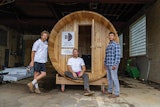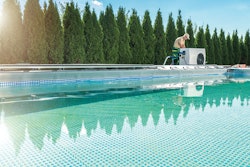Coming in May AQUA, The State of the Industry

That time is now. In the next issue of AQUA, we inaugurate a moment of self-analysis for the pool and spa industry with our first annual State of the Industry issue. Several months ago, we directed an inquiry into the pressing topics and simple facts of life for builders, retailers and service people. We went to the people that actually deal with the everyday problems of building pools, selling spas and keeping them clean and in working order and just asked them about it. Then we assembled their comments and insights in print and present them in the May issue of AQUA magazine.
Association Announces Industry Summit

The conference will be geared toward "attacking the issues that all businesses face" with special emphasis on ideas and strategies for moving business forward in the upcoming year and beyond, according to an APSP release. In addition to six speakers on select topics, the association is planning a networking dinner for Monday, June 28 to give attendees the opportunity to network with industry colleagues before the event starts and to meet informally with the event's scheduled speakers.
"When I first joined the industry, a number of the visionary leaders organized an annual Leadership Conference that became a 'must attend' for senior executives in the pool and spa business," says Bruce Fisher, chairman of the Manufacturers' Council. "At our November meeting in Las Vegas, we explored the idea of bringing a leadership conference back to life. What better time than now to share ideas and take advantage of a 'hands-on' meeting designed to showcase market-changing events from the perspective of experts on each subject?"
Among the scheduled speakers are Doug Harrison of the Harrison Group, who will address the luxury consumer; Tony Hoskins of POP, an expert in digital platforms and interactivity with customers, who will talk about technology; and Bil Kennedy of PK Data, who will share some of his company's research on industry trends. Other speakers will address economics, finance and leadership.
The cost ranges from $299 for APSP members in retail, service or building to $499 for the first attendee from a distributor or manufacturer. Costs increase for non-members.
To register or to learn more, visit www.apsp.org.
SPEC Bill Passes Big Test

The newly amended bill - AB 2409 - revises the Urban Water Management Planning Act to direct cities and counties to define "water features" - such as fountains, ponds, streams and waterfalls where water is artificially supplied - separately from pools and hot tubs.
The state Department of Water Resources (DWR) and the Sierra Club, among others, expressed concern with the original draft of AB 2409, which would have exempted swimming pools and hot tubs from MWELO.
SPEC's concern was that in the event of a drought, public and private swimming pools and hot tubs could be forced to close by city or county officials.
"This compromise language, which was developed from discussions with the Department of Water Resources, addresses SPEC's principal concern," Norwood says. "And SPEC will not have to monitor the ordinances of 58 counties, 458 cities, 300 water districts and various sewer agencies to make sure they do not combine the treatment of decorative water features with swimming pools, spas and hot tubs when they develop water contingency or drought plans."











































